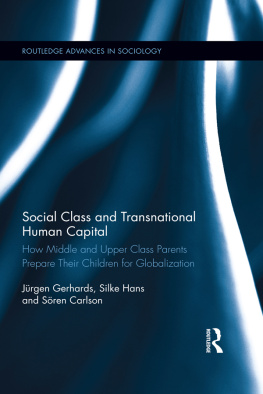First published 2017
by Routledge
2 Park Square, Milton Park, Abingdon, Oxon OX14 4RN
and by Routledge
711 Third Avenue, New York, NY 10017
Routledge is an imprint of the Taylor & Francis Group, an informa business
2017 Jrgen Gerhards, Silke Hans and Sren Carlson
The right of Jrgen Gerhards, Silke Hans and Sren Carlson to be identified as authors of this work has been asserted by them in accordance with sections 77 and 78 of the Copyright, Designs and Patents Act 1988.
All rights reserved. No part of this book may be reprinted or reproduced or utilised in any form or by any electronic, mechanical, or other means, now known or hereafter invented, including photocopying and recording, or in any information storage or retrieval system, without permission in writing from the publishers.
Trademark notice: Product or corporate names may be trademarks or registered trademarks, and are used only for identification and explanation without intent to infringe.
British Library Cataloguing-in-Publication Data
A catalogue record for this book is available from the British Library
Library of Congress Cataloging-in-Publication Data
A catalog record for this book has been requested
ISBN: 978-1-138-23202-0 (hbk)
ISBN: 978-1-315-31373-3 (ebk)
Typeset in Times New Roman
by Apex CoVantage, LLC
This book was translated by Roisin Cronin and Stefan Ernsting.

Routledge Advances in Sociology
For a full list of titles in this series, please visit www.routledge.com/series/SE0511.
205 Alevis in Europe
Voices of migration, culture and identity
Edited by Tzn Issa
206 On the Frontlines of the Welfare State
Barry Goetz
207 Work-Family Dynamics
Competing logics of regulation, economy and morals
Edited by Berit Brandth, Sigtona Halrynjo and Elin Kvande
208 Class in the New Millennium
Structure, homologies and experience in contemporary Britain
Will Atkinson
209 Racial Cities
Governance and the segregation of Romani people in urban Europe
Giovanni Picker
210 Bourdieusian Prospects
Edited by Lisa Adkins, Caragh Brosnan and Steven Threadgold
211 Alienation and Affect
Warren D. TenHouten
212 Homeownership, Renting and Society
Historical and comparative perspectives
Sebastian Kohl
213 Social Class and Transnational Human Capital
How Middle and Upper Class Parents Prepare Their Children for Globalization
Jrgen Gerhards, Silke Hans and Sren Carlson
This book is a revised and updated version of our German edition Klassenlage und transnationales Humankapital: Wie Eltern der mittleren und oberen Klassen ihre Kinder auf die Globalisierung vorbereiten. We would like to thank several institutions and individuals who have supported us in carrying out the present study. The German Research Foundation (DFG) funded the project from which this study emerged. Laura Einhorn, Philipp Eisnecker, Inga Ganzer, Kristina Herbst, Tian Hu, Svenja Kaiser, Charlotte Lorentz, Maren Meyer, Mira Mller, Friederike Molitor, and Sarah Rasche were involved in coding and analyzing the job advertisements, conducting and transcribing the interviews with the student exchange organizations and parents, researching the literature, and correcting the manuscript. Without the commitment and diligence of the people mentioned here, we could not have completed this project.
Michael Weichbrodt kindly provided us with data he collected on student exchange organizations. Daniel Drewski was involved in the analysis and evaluation of job advertisements. We received helpful comments from Sebastian Bttner, Lucia Leopold, Steffen Mau, Susanne Pernicka, Jrg Rssel, Thomas Terbeck, and Michael Weichbrodt.
Special thanks go to Roisin Cronin and Stefan Ernsting, who did a terrific job in translating large parts of the German manuscript into English and copyediting those parts which were already written in English.
Jrgen Gerhards, Silke Hans, and Sren Carlson
A.1 Systematic content analysis of job advertisements in newspapers and survey on foreign language use at work (Chapter 2)
Content analysis
Our sample consists of job advertisements in four national and local newspapers from Germany ( Frankfurter Allgemeine Zeitung [ FAZ ] and Berliner Morgenpost ) and the Netherlands ( de Volkskrant and Leeuwarder Courant ) published in the years 1960, 1980, 2000, 2010, and 2014. The four newspapers are among the most important local and national newspapers in their respective countries. A random sample of 250 job advertisements per year was drawn from issues published in early February or March.
The job specifications were analyzed according to the method of systematic content analysis. The coding unit is the single advertised position. Thus, one job advertisement could contain one or more job offers. Postings that referred to inaccessible sources (such as the Internet) or offering directorships, trainings, apprenticeships, internships, voluntary services, and so forth were not coded. The coding scheme includes measures of the exact job title (open code), its professional field, and required qualifications as well as the required transnational human capital. We coded four different dimensions for transnational human capital. The first dimension was foreign language skills. We coded whether a job posting asked for a foreign language, and if so, which one(s). The second dimension of transnational human capital refers to knowledge about or expertise concerning other countries and societies. The third dimension of transnational human capital is defined as cross-cultural competence. It refers to the openness, understanding, and empathy required to properly communicate and interact with people from diverse cultural backgrounds. Postings that asked for such things as ability to work in international teams or openness towards other cultures received this code. International experiences constitute the fourth dimension of transnational human capital. This code was given when advertisements asked for, for example, educational experiences abroad.
Apart from transnational human capital, the coding scheme takes into account two further dimensions of the globalization of labor markets with two indicators each: first, the internationality of the employer measured in terms of the employers international orientation and the geographical location of the headquarters and of the job position in question, referring to whether a job requires foreign
Eurobarometer survey
The content analysis of job advertisements is complemented by an analysis of survey data from the 2012 Eurobarometer (EB) 77.1, which includes questions about respondents foreign language use. The EB surveys are conducted in the form of face-to-face interviews in all EU member states (as well as in accession countries); the sample amounts, per country, to 1,000 interviewees (on average) older than 15 years. With regard to their foreign language skills, respondents in the EB 77.1 were asked, first, about which foreign languages they speak well enough to have a conversation in, and second, about the situations in which they have used these foreign languages. The interviewees could choose from a list containing several items. Our analysis refers to the use of foreign languages at work. This includes having conversations with colleagues, reading and writing emails and letters, and business travel abroad. The responses were recoded as a dummy variable, acquiring the value 1 for mentioning at least one of these items and the value 0 for mentioning none. Only the answers of currently employed, non-immigrant interviewees were considered.










